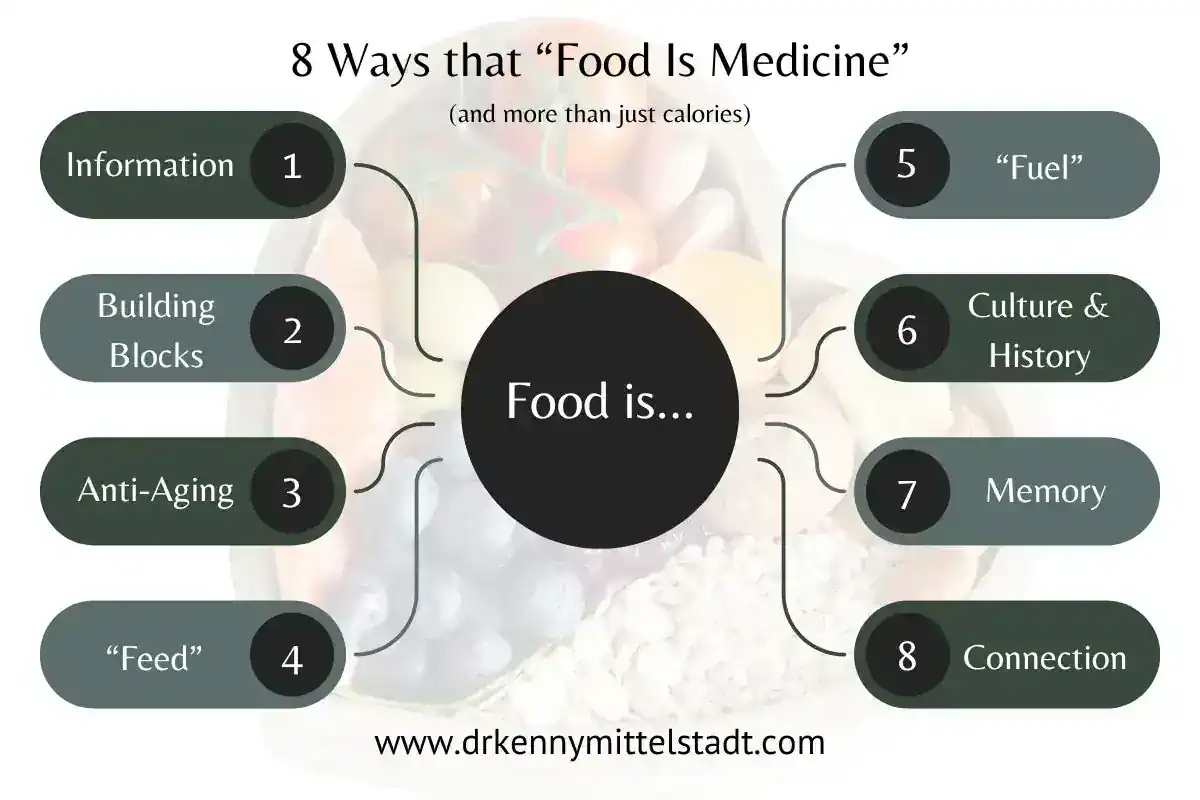Oh no, not another conversation about calories!!
Don’t worry, this discussion is all about 8 things that food represents beyond just calories. Though our understanding of calories and “balanced” eating can be important in the realm of health and wellness, it is so much more – it’s also “medicine.”
To be frank, we’ve had anxiety around food as calories since the early 1900’s. Though the calorie was first defined as a unit of energy in food about a hundred years earlier in the 1800’s, our obsession with counting them and “disciplining the stomach” has created a strange relationship between the consumer and consumed for over a century!
I hope that you find this exploration informative, thought-provoking, and hopefully even validating. You may have seen Hippocrates’ words, “Let Food Be Thy Medicine”. It’s a central pillar of functional medicine and health creation!
Let’s dive into the beautiful complexity that is food beyond calories.

1. Food as Information
I geek out about this frequently. Did you know that the foods that we eat are basically chemical information. It interacts with each of our cells, and food can even direct the turning on and off of our genes!
Our bodies rely on this information in so many ways too! From signaling the immune system and regulating some hormonal pathways, food as information is a fascinating study!
2. Food as Building Blocks
Most directly, the proteins that we eat, both plant and animal sources, are built from smaller building blocks called amino acids. These are the same building blocks that literally makes us up! Everything, from our hair and skin to our livers and muscles are made up of these amino acids and other nutrients.
This is why protein in our diet is so important – and that we are able to digest it and absorb it properly. Any issues with protein digestion and absorption can affect virtually every physical piece of our bodies!
And it doesn’t stop there! Fats are a pivotal component of the membrane around each and every one of our cells. Calcium becomes and important building block for bone. And the list goes on in the ways our makeup is dependent on food.
3. Food as Anti-inflammatory & Anti-aging Intervention
Food has the power to decrease inflammation and even slow cellular aging in the body. The anti-aging industry and its many branches try to recreate and magnify the same mechanisms by which food has the potential to act.
Antioxidants are a nutrient classification that helps to curb inflammation and oxidation (aging) in the body. Generally speaking, they can be found in highest concentrations in colorful fruits, vegetables, and other plant-based foods.
If you feel that inflammatory foods may be affecting you, look into it! Inflammation, especially from consuming ultra processed foods has been linked to diabetes, obesity, cardiovascular disease, various cancers, and depression.
You can find plenty of information on low-inflammatory foods or consider a temporary elimination diet. Consult with your functional medicine practitioner for more specific advice on how food is medicine for your particular needs!
4. Food as Feed (for the Microbiome)
We’ve heard the phrase, “you are what you eat,” but there’s an added layer to this. More accurately, I would rewrite this as “you are what you and your microbiome eat.”
It’s true, we digest a lot of our food products ourselves. But our gut bacteria also breakdown and ferment certain resistant starches, fibers, and other plant-based products called phytonutrients. This fermentation is important as it results in energy production for our gut lining and even plays a role in communication and signaling anti-inflammation.
Just like fertilizing a garden, if you feed your microbiome the right balance of foods, it can flourish or wither. A flourishing gut supports our immune system, energy production, and the ability to detox among many other things! Food becomes the driver of balance or imbalance in the bacteria in our guts!
5. Food as Fuel
This is pretty close to a conversation about calories, but not from a counting sense. The nutrients that we eat and absorb supply our body with energy and products to carry out the plethora of chemical reactions that happen every second!
Quite literally, the carbohydrates, fats, and even proteins become the proverbial “gasoline” that powers our system! Without enough fuel, many of our functions can be performing less efficiently, and with too much, it can “flood” our system as well.
6. Food as Culture and History
Food is undeniably tied to expression of culture and history, and therefore identity. There is much wisdom that can be gleaned from observing cultural and familial eating patterns, food combinations, and seasoning food that doubles as potent medicine.
There’s nothing quite like “home cooking,” no matter where your home is. One study that looked at links between availability of cultural foods on well-being in college students found that there was an increased risk of depression and anxiety if they lacked access to cultural foods!
7. Food as Memory
Food, and especially our sense of smell is intertwined with areas in our brain that control memory. This is why we often have more of an “emotional” connection with smells compared to our other senses.
Think about that food or a particular smell that triggers for you a memory. We build memories constantly, and food and scent is a great way to etch memories into the mind.
Stress and anxiety around eating has a similar effect. If a person experiences anxiety and too much restraint on food, it can link emotions of guilt and fear with the process of eating. Healthy eating patterns such as the Mediterranean diet are associated with better mental health outcomes.
8. Food as Connection
Perhaps my favorite food-related point is how it has the power to foster connection. Eating has been a social activity since the beginning. Some of my fondest memories were cooking with friends in the dorms or prepping holiday meals with family friends!
In many ways, by focusing on the nutritional aspects of food with the rise in chronic disease, we are detracting from the social impact of food. Food is medicine, both physically, and emotionally. Isolation affects the risk and progression of many chronic diseases.
Conclusion
Honestly, I know that this can be a dense, potentially triggering, and conflicting topic. But I hope this sparks a bigger picture understanding, even excitement around food as medicine. Though complex, there can be beauty in understanding and appreciating the complexity for what it is.
This may be oversimplified, but I think there’s some truth to saying, “there is no one-size-fits-all” when it comes to food and eating behaviors.
I hope you walk away from reading this feeling encouraged to shift your perspective on food to its many medicinal qualities. It’s easy to get lost in the noise of dieting, but I firmly believe that author, Michael Pollan, summed up how we should eat in this short phrase:
“Eat food. Not too much. Mostly plants”
-Michael Pollan (In Defense of Food)
Did this resonate with you! Feel free to share with a friend, follow me on instagram, or sign up for my mailing list below to stay connected! “Health is contagious, share the love!”
About the Author
Dr. Kenny Mittelstadt is a root-cause health detective and functional medicine practitioner practicing in Texas, California, and Florida. Trained through the Institute for Functional Medicine with dual doctorates earned at highest honors from Southern California University of Health Sciences, he helps patients solve complex health issues naturally using advanced functional lab testing and personalized holistic care instead of conventional medications.

